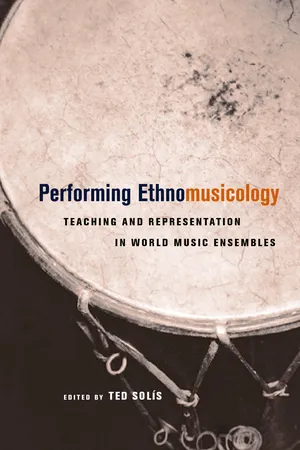Performing Ethnomusicology
About this book
Performing Ethnomusicology is the first book to deal exclusively with creating, teaching, and contextualizing academic world music performing ensembles. Considering the formidable theoretical, ethical, and practical issues that confront ethnomusicologists who direct such ensembles, the sixteen essays in this volume discuss problems of public performance and the pragmatics of pedagogy and learning processes. Their perspectives, drawing upon expertise in Caribbean steelband, Indian, Balinese, Javanese, Philippine, Mexican, Central and West African, Japanese, Chinese, Middle Eastern, and Jewish klezmer ensembles, provide a uniquely informed and many-faceted view of this complicated and rapidly changing landscape. The authors examine the creative and pedagogical negotiations involved in intergenerational and intercultural transmission and explore topics such as reflexivity, representation, hegemony, and aesthetically determined interaction. Performing Ethnomusicology affords sophisticated insights into the structuring of ethnomusicologists' careers and methodologies. This book offers an unprecedented rich history and contemporary examination of academic world music performance in the West, especially in the United States. " Performing Ethnomusicology is an important book not only within the field of ethnomusicology itself, but for scholars in all disciplines engaged in aspects of performance—historical musicology, anthropology, folklore, and cultural studies. The individual articles offer a provocative and disparate array of threads and themes, which Solís skillfully weaves together in his introductory essay. A book of great importance and long overdue."—R. Anderson Sutton, author of Calling Back the Spirit Contributors: Gage Averill, Kelly Gross, David Harnish, Mantle Hood, David W. Hughes, Michelle Kisliuk, David Locke, Scott Marcus, Hankus Netsky, Ali Jihad Racy, Anne K. Rasmussen, Ted Solís, Hardja Susilo, Sumarsam, Ricardo D. Trimillos, Roger Vetter, J. Lawrence Witzleben
Tools to learn more effectively

Saving Books

Keyword Search

Annotating Text

Listen to it instead
Information
Table of contents
- Cover
- CONTENTS
- ACKNOWLEDGMENTS
- INTRODUCTION. TEACHING WHAT CANNOT BE TAUGHT: AN OPTIMISTIC OVERVIEW
- PART ONE. SOUNDING THE OTHER: ACADEMIC WORLD MUSIC ENSEMBLES IN HISTORICAL PERSPECTIVE
- PART TWO. SQUARE PEGS AND SPOKESFOLK: SERVING AND ADAPTING TO THE ACADEMY
- PART THREE. PATCHWORKERS, ACTORS, AND AMBASSADORS: REPRESENTING OURSELVES AND OTHERS
- PART FOUR. TAKE-OFF POINTS: CREATIVITY AND PEDAGOGICAL OBLIGATION
- AFTERWORD. SOME CLOSING THOUGHTS FROM THE FIRST VOICE
- WORKS CITED
- LIST OF CONTRIBUTORS
- INDEX
Frequently asked questions
- Essential is ideal for learners and professionals who enjoy exploring a wide range of subjects. Access the Essential Library with 800,000+ trusted titles and best-sellers across business, personal growth, and the humanities. Includes unlimited reading time and Standard Read Aloud voice.
- Complete: Perfect for advanced learners and researchers needing full, unrestricted access. Unlock 1.4M+ books across hundreds of subjects, including academic and specialized titles. The Complete Plan also includes advanced features like Premium Read Aloud and Research Assistant.
Please note we cannot support devices running on iOS 13 and Android 7 or earlier. Learn more about using the app
